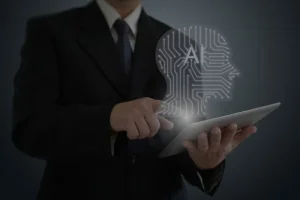What is AI in Recruitment?
AI in recruitment refers to the use of artificial intelligence tools to help with the hiring process. From the initial candidate search to the final offer, software now handles parts of the hiring process that were previously handled solely by people.
You may be familiar with resume screeners, but AI now supports a wide range of hiring processes. It can scan large applicant pools, identify strong matches, answer common questions via chatbots, and schedule interviews with minimal manual effort. This allows recruiters to spend less time performing repetitive tasks and more time developing genuine relationships with candidates and hiring managers.
Because AI for recruitment improves hiring efficiency, it is rapidly gaining popularity. According to research, this market could be worth around 1.75 billion dollars in 2026, with a potential growth rate of well over 2.9 billion dollars in subsequent years. That pace demonstrates that AI in recruitment is not a passing fad, but rather a long-term shift in how businesses plan recruitment, attract, and select talent.
Many HR and recruitment teams already use AI tools in their daily work, from entry-level positions to specialist sales talent. The goal is not to replace recruiters, but to help make better decisions using data and clear insights. In this article, we will look at how these tools work in practice and what they mean for employers and candidates.
Core Benefits of Using AI Throughout the Recruitment Journey
AI can improve almost every stage of hiring, from the first job post to the final offer. When you use smart tools with people-centred thinking, you can make a sales recruitment journey feel smoother for both candidates and hiring teams.
Saving time across the hiring journey
One of the clearest advantages of AI in recruitment process is how much time it saves on repetitive work. AI tools can scan resumes, score applications, and arrange interview slots in minutes instead of days, even in high-volume campaigns. With AI for recruiting taking care of these tasks, recruiters can focus on human conversations, thoughtful interviews, and strong hiring presentations for managers.
Reducing bias and opening up talent pools
AI can also support fairer hiring when it is designed and monitored in the right way. It can analyse large data sets to identify patterns that human recruiters may overlook and recommend wording for job postings that attract a diverse range of candidates. When teams keep an eye on the training data and review the results often, AI becomes a partner that helps reduce the impact of unconscious bias.
Improving communication with every candidate
Another significant benefit is improved and more consistent communication. Chatbots and automated emails can quickly answer common questions, share clear timelines for each stage of the process, and provide applicants with progress updates. This consistent flow of information helps to protect your employer’s reputation by making candidates feel seen, respected, and informed, even if they are not hired.
How AI Is Transforming the Hiring Process in 2025
AI is transforming the hiring process in 2025, making it more efficient and human-centered. Many recruiters now spend far less time on manual checks and more time speaking with people, because routine tasks are handled by smart tools. This shift means the work feels more focused, more human, and less buried in spreadsheets and inboxes.
One of the biggest changes comes from faster screening. Global time to hire still averages around forty-four days, yet tools that use artificial intelligence in recruitment can review large groups of applicants in minutes. They scan online applications for skills, experience, and qualifications, then remove profiles that clearly do not fit, so recruiters look only at stronger matches.
This kind of quick filtering works really well when there are a lot of people applying. When thousands of people apply for a role, a human team alone would struggle to give each person a fair first check. With AI-powered filters in place, the team can keep up with demand while still finding the most promising candidates.
Things are also getting better for candidates. Smarter systems help keep people informed, from the first application to the final decision, which makes the journey feel smoother and more respectful on both sides of the process.
How AI Supports Better Diversity, Inclusion, and Bias-Aware Hiring
Diversity and inclusion are now core parts of most hiring strategies, yet they can be hard to put into practice. Even well-intentioned recruiters can be influenced by unconscious bias, which shapes their decisions in ways they are unaware of. AI can assist teams by providing additional data and spotting unconscious bias.
One practical application is in the language of job postings and career pages. AI tools can scan text for gendered or biased terms and recommend more neutral alternatives that appeal to a broader range of people. Studies have shown that many women feel less drawn to roles that use strongly masculine wording, so small changes in language can increase the number of people who feel confident enough to apply.
By checking wording at scale, AI promotes fair hiring practices without requiring recruiters to identify every issue on their own. It works best when HR teams approach it as a partner, reviewing its recommendations and ensuring they align with their values. In this way, AI can be part of a long-term plan to welcome more diverse talent into every stage of the recruitment journey.
Practical Applications: Where AI Fits into Today’s Recruiting Workflow
Screening and rediscovering candidates
Screening is still the most common place where AI is used in recruiting, and it is getting smarter every year. Modern recruiting platforms can read resumes and applications, pull out key details like skills, experience, and education, then compare them with the must-have and nice-to-have criteria for each role. They can also scan past applicants in your database when a new role opens, so people who once heard that their resume would stay on file may actually get a new chance when a better vacancy appears.
This kind of automated sorting means recruiters start their day with a focused list of strong profiles instead of a huge pile of unfiltered CVs. For busy teams, especially those hiring in large volumes, that shift can change the pace of hiring and make shortlists more consistent. It also helps reduce the risk that a great candidate is missed simply because their application arrived at a busy moment.
Chatbots as candidate partners
Chatbots are another clear fit in a modern recruiting workflow. They can answer common questions about the role, the company, and the process, so candidates do not need to wait for an email reply. Once someone applies, the same chatbot can share updates, explain what will happen next, and point them to useful resources that help them prepare.
For HR teams, this support removes a lot of repeated admin work. The team spends less time replying to simple questions and more time on interviews, preparing hiring proposals, and providing meaningful feedback. Candidates also feel more informed, which makes the process seem more transparent and respectful.
Smarter outreach and scheduling
AI tools can also help with outreach when you need to move quickly. They can send personalised messages to each candidate about interview scheduling, job offers, or talent pool updates while maintaining a consistent tone and brand alignment. Many AI platforms now recommend meeting times that are convenient for both parties and handle rescheduling, which can be a huge time saver.
This type of automation is particularly useful in large organisations that run multiple hiring campaigns at the same time. Rather than chasing long email threads, recruiters can track progress on a simple dashboard. As a result, recruiters can respond faster when a candidate requires assistance with the next step.
Text generation for clearer and fairer content
Text generation tools support the written side of recruitment. They can read several past job descriptions and help you build new ones that match your goals and your tone of voice. Some tools also highlight language that may feel gendered or exclusive, then offer more inclusive alternatives that attract a wider variety of applicants.
Teams can use these tools to create consistent content across job boards, social posts, and career sites. Recruiters still decide final wording, but now they no longer have to draft every line from scratch. Over time, this makes your message in the market clearer, more inclusive, and easier to keep up to date.
Real-World Examples of Successful AI-Driven Recruitment
Unilever is a well-known example of AI-driven hiring. The company uses online games and AI video interviews to screen entry-level candidates, which has helped it shorten recruitment time by around three-quarters and save significant interview hours, all while hiring more diverse candidates.
Chipotle Mexican Grill uses an AI hiring assistant called Ava Cado to handle high-volume seasonal recruitment. The chatbot engages with applicants, guides them through the application process, and schedules interviews, significantly improving recruitment efficiency by increasing application submission rates to over 80% and shortening the time from application to hire from twelve days to just four.
Limitations, Risks, and Challenges of AI-Powered Hiring
When AI repeats old biases
AI can seem neutral, yet it often learns from old data that was not fair to begin with. If past hiring decisions favoured people from certain schools, backgrounds, or locations, the system can absorb that pattern and treat it as a sign of success. This can quietly push similar people forward and hold others back, even when no one wants that.
These patterns are hard to spot without careful checks. Recruiters may only notice that shortlists look strangely similar, while the real issue sits inside the training data. Regular audits, diverse test profiles, and working closely with trusted providers can help show where hidden bias appears.
Once these issues are identified, teams can take action. They can change the data, tune the model, or change where AI is used in the process. This way, technology and human judgment work together to make hiring fairer instead of repeating old habits.
Accuracy gaps and missed context
AI screening is powerful, but it still has limits. Many tools depend on keywords, which means a great candidate who uses different words for the same skill might be passed over. At the same time, someone could fill their resume with the right terms and pass the screening even if their real experience does not make them a suitable candidate.
These gaps can lead to odd and sometimes unfair shortlists. Strong applicants can be filtered out too early, while weaker profiles move ahead. Human judgment is still needed to review AI suggestions and make sure the final decisions reflect the whole picture.
The need for enough data
AI requires a consistent flow of high-quality data. This is not an issue with high-volume hiring because the system has a large number of samples to learn from. In smaller or highly specialist searches, the data may be insufficient for the tool to identify reliable patterns.
Even in these cases, AI can still provide value, albeit in different ways. Instead of taking over the entire screening process, it can help in the creation of clearer job postings or identifying potential candidates from external sources; the key is to choose the appropriate tool for the task at hand.
The importance of trust and transparency
People must believe they can trust how AI is used in hiring. Candidates can start to worry about how decisions are made if they feel secret or hard to understand. The process seems more fair once you explain how AI helps and how human recruiters still make the final decision.
Being open about the process also matters. Tell candidates what data you collect, how long you keep it, and how it supports hiring decisions. Simple, clear messages on job ads, career pages, and during interviews can ease a lot of concern.
Good practice turns that trust into something real. Regular checks, clear rules, and visible human oversight show that AI does not make the final decision. Instead, it acts as a tool that helps people make thoughtful and fair choices.
How to Integrate AI Tools Into Your Existing Recruitment Systems
Bringing AI into your recruitment systems works best when you take it step by step. Instead of adding a tool just because it looks new and exciting, start with clear problems you want to solve, such as slow screening or weak candidate engagement. From there, you can pick tools that really support your goals and that connect well with your current HR platforms.
Helpful steps include:
- Define your aims and decide where AI should help, such as sourcing, screening, or communication
- Choose tools that work with your Applicant Tracking System (ATS) and HR software and that match your hiring needs
- Keep a balance between automation and human contact so candidates still feel seen and heard
- Run regular checks to spot bias and fix any unfair patterns in AI decisions
- Train recruiters so they can read AI insights and use them with confidence
Once your tools are live, keep an eye on the results. Track how AI affects time to hire, candidate feedback, and quality of hire, then adjust your settings and process as you learn.
Will AI Replace Human Recruiters or Simply Strengthen Their Role?
AI is unlikely to replace human recruiters, but it will change how they work. Tools are great at handling repeatable tasks, such as screening large numbers of applications or sending updates, and they can do this at scale. What they cannot do well is build real trust with candidates or read the nuance in a complex conversation.
That is where recruiters remain essential. Their judgment, empathy, and real-world insight help them challenge AI results, notice hidden potential, and support hiring managers in making better decisions.
How Fully Automated Recruitment Systems Work
Fully automated recruitment systems link many AI tools into one seamless process. They watch market trends and internal data, then act on that information with very little manual work. In the strongest setups, AI supports everything from employer branding to managing job offers and ensuring compliance, while human recruiters stay in charge of goals and guardrails.
Here is how a typical system can work:
- AI scans social media, reviews, and past campaigns to suggest content that strengthens your employer brand and reaches the right groups of candidates.
- Workforce analytics tools read HR data to spot skills gaps and predict future hiring needs so you can plan ahead.
- Recruitment tools turn those needs into clear descriptions and post them on the best job boards and channels.
- Sourcing engines search resumes, profiles, and talent pools to find strong matches and suggest both external and internal candidates.
- Screening and assessment tools score skills, behaviour, and potential, then rank candidates so recruiters see the best fits first.
- Scheduling assistants manage interview invitations, time zone adjustments, and follow-ups, minimising the need for back-and-forth emails.
- For some roles, AI video interviews record and score responses, while separate tools help candidates practise and build confidence
- Offer tools to compare market data, budget, and candidate expectations, then propose fair salary and benefits options.
- Compliance and audit tools track decisions and outcomes, watching for bias and making sure the process follows local rules.
All of this can run with very little manual input once it is set up. The aim is not to remove people from hiring, but to give them clearer insight and more time for real conversations. When used with care and strong oversight, fully automated systems can make complex hiring plans easier to manage at scale.
Using AI Strategically to Improve Hiring Outcomes
AI is changing how hiring works, making it faster, sharper, and more consistent, especially in busy sales environments. When you use it with a clear plan, AI can help you spot strong sales talent sooner, keep candidates updated, and learn from each campaign.
At Frontline Sales Recruitment, we use AI tools throughout the process, from sourcing and screening to shortlisting and feedback. The goal is straightforward: to help you reach more of the right people, move quickly on the best matches, and build teams that perform well in real-world sales situations.
FAQs
Today, there are several leading AI recruiting tools that cover different parts of the hiring journey. Large platforms such as Workday and Eightfold help with sourcing, matching, and workforce planning, while tools like Paradox, with its Olivia assistant and HireVue, focus on high-volume chat-based hiring and structured video assessment.
It can support diversity by helping you write more inclusive job ads and career content. Intelligent writing tools scan your text for gendered or exclusionary language and suggest more neutral wording, so people from a wider range of backgrounds feel encouraged to apply.
Another advantage is that AI does not have feelings or assumptions in the way people do. When you train it on careful, balanced data and review the outcomes often, its recommendations can become more consistent and less affected by unconscious bias than purely manual decisions.
To stay current on AI hiring trends, attend HR and tech events, read a few trusted HR tech websites, and attend AI recruitment webinars. They provide new examples and ideas to try.
It is also a good idea to follow a few experts and participate in online HR communities to learn what works in real-world teams rather than just in theory.
AI-driven internal mobility changes talent acquisition by helping you see the potential that already exists in your team. It looks at skills, experience, and career goals, then suggests people for new roles or projects. This reduces the need for external hiring, lowers costs, and helps people feel more valued and motivated to stay.





